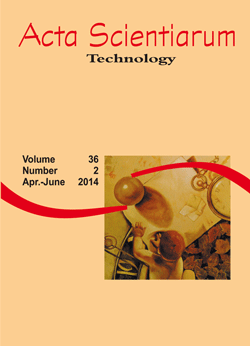<b>Modeling and simulation of an isothermal reactor for methanol steam reforming<b>
DOI:
https://doi.org/10.4025/actascitechnol.v36i2.18850Palavras-chave:
mathematical modelling, methanol, steam reforming, hydrogenResumo
Due to growing electricity demand, cheap renewable energy sources are needed. Fuel cells are an interesting alternative for generating electricity since they use hydrogen as their main fuel and release only water and heat to the environment. Although fuel cells show great flexibility in size and operating temperature (some models even operate at low temperatures), the technology has the drawback for hydrogen transportation and storage. However, hydrogen may be produced from methanol steam reforming obtained from renewable sources such as biomass. The use of methanol as raw material in hydrogen production process by steam reforming is highly interesting owing to the fact that alcohol has the best hydrogen carbon-1 ratio (4:1) and may be processed at low temperatures and atmospheric pressures. They are features which are desirable for its use in autonomous fuel cells. Current research develops a mathematical model of an isothermal methanol steam reforming reactor and validates it against experimental data from the literature. The mathematical model was solved numerically by MATLAB® and the comparison of its predictions for different experimental conditions indicated that the developed model and the methodology for its numerical solution were adequate. Further, a preliminary analysis was undertaken on methanol steam reforming reactor project for autonomous fuel cell.
Â
Downloads
Downloads
Publicado
Como Citar
Edição
Seção
Licença
DECLARAÇíO DE ORIGINALIDADE E DIREITOS AUTORAIS
Declaro que o presente artigo é original, não tendo sido submetido í publicação em qualquer outro periódico nacional ou internacional, quer seja em parte ou em sua totalidade.
Os direitos autorais pertencem exclusivamente aos autores. Os direitos de licenciamento utilizados pelo periódico é a licença Creative Commons Attribution 4.0 (CC BY 4.0): são permitidos o compartilhamento (cópia e distribuição do material em qualqer meio ou formato) e adaptação (remix, transformação e criação de material a partir do conteúdo assim licenciado para quaisquer fins, inclusive comerciais.
Recomenda-se a leitura desse link para maiores informações sobre o tema: fornecimento de créditos e referências de forma correta, entre outros detalhes cruciais para uso adequado do material licenciado.



















